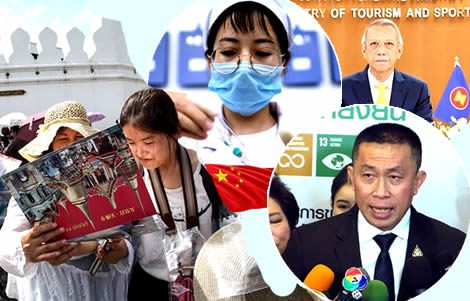G4 was highlighted earlier this month by a team of Chinese disease control experts and derives from the 2009 Swine flu or H1N1 virus. The findings were published in the US Journal Proceedings of the National Academy of Sciences. The study has, however, been strongly rejected by the Ministry of Agriculture and Rural Affairs in Beijing. The new controversy highlights the fearful environment engulfing the world as governments and airline industry leaders scramble to find a way to resume the operations of the global flight network. At the end of June, the UK government threw out the travel bubble concept and instead opted for a traffic light system with screening and testing at each end as a way to reopen that country’s borders even with other countries equally hard hit by the Covid virus and amid continuing infections.
Thailand’s Transport Minister, Saksayam Chidchob, has warned that Thailand will not reopen its gates to international flights as long as a residual threat remains from the Covid 19 virus and stressed that the health of the Thai public outweighs all in government considerations of the matter. It followed the rejection, this week, of a plan put forward by the Tourism Minister, Phiphat Ratchakitprakarn, to use popular tourists hotspots as part of an isolated holiday bubble offering targeted initially at tourists from China as well as South Korea and Japan. The breakout of the virus in Australia this week has also highlighted the capricious nature of this continuing threat.

Fear of an emerging second wave of the Covid 19 virus was one of the key factors that caused senior Thai officials working within the Covid 19 Situation Administration Centre to suspend any plans for a return of tourists to the kingdom in August. The cautious note struck comes amid reports of a potential new virus threat in China.
The move is expected to have further repercussions for any plans for restarting incoming international air travel to Bangkok and other Thai airports. It means it is likely we will not see normal passenger flights into Thailand until at least September and possibly well beyond.
Plan to launch tourism in August shelved indefinitely for now amid heightened fear of a second wave
The canny plan, rejected on Tuesday, was announced last week by the Minister of Sports and Tourism in what was seen as a practical effort to restart Thailand’s tourism industry in August with strictly controlled travel bubble arrangements notably commencing with cities and provinces in China and organised by small tour agencies.
On Tuesday, the director-general of the Civil Aviation Authority of Thailand, which controls international flight access to the kingdom, confirmed that plans to finalise travel bubble arrangements with three participating countries, which were still at a discussion phase, had been shelved.
The countries concerned were China, South Korea and Japan.
Mr Chula Sukmanop attributed the decision to a worldwide spike in infections and fears of a second wave of the Covid 19 virus.
South Korea and Japan see a resurgence in infections
At the end of June, South Korea confirmed a second wave of infections in the country. This was accompanied by moves to restrict entry by foreigners from some countries notably Bangladesh and Pakistan.
The number of daily infections in South Korea has been stable but it has risen markedly since the end of May. The numbers are between 40 and 70 infections per day. On Thursday, the confirmed figure was 43.
It is a similar story for Japan where the state of emergency was lifted at the end of May only to see infections spike again reaching 262 new infections last Monday. On Thursday, the figure was 197.
Chinese scientists identify a new virus and potential candidate for a second pandemic named as G4
In China, there has been since the end of June, credible reports of a threat from a virus named as G4 and linked to the 2009 swine flu threat. A published report by Chinese scientists described a virus with the potential to spread to human beings and be damaging to health.
The new virus is a mutation of the 2009 swine flu virus, H1N1, which appears to be specifically adapted to infect human beings.
Tests on ferrets have shown the virus is alarmingly infectious and also that it quickly develops in human cells potentially causing severe symptoms.
The warnings come from scientists who have worked with China’s Centre for Disease Control and Prevention as well as Chinese academics.
Their report cited a combination of different virus strains and said the G4 virus possessed ‘all the essential hallmarks of being highly adapted to infect humans.’
Reports of the virus quickly brought an assurance from China’s Foreign Ministry spokesman Zhao Lijian who said: ‘We will take all necessary measures to prevent the spread and outbreak of any virus.’
China’s Ministry of Agriculture rubbishes new virus fears saying it is nothing new, cannot transmit
However, these findings have been roundly rejected by the Chinese Ministry of Agriculture which says the virus is nothing new and has been monitored in pigs for some time.
The ministry, quoting its own expert on viral infections found in pigs, Yang Hanchun, has disputed that this virus has become dominant in the Chinese swine industry.
The ministry further rejected claims that the virus could be transmitted to human beings describing the academic article as being presented by the media in an ‘exaggerated and nonfactual way’.
It stoutly rejected the claims that this already known virus had adapted itself for human transmission and could be infectious.
The published report by Chinese scientists had earlier suggested that the tests on ferrets had revealed severe symptoms.
Lockdown in Australia shows the danger
The Australian city of Melbourne, the state capital of Victoria, in the last 48 hours has ordered a 6-week lockdown in the city as a surge in Covid 19 cases emerged. The state has announced 288 infections in the last 24 hours as the virus appears to have taken hold.
Authorities there, announcing the lockdown, are also pointing out, as an assurance to the public, that the rise in reported infections is directly linked to a massive campaign of testing.
This includes 30,000 people being tested in a 24 hour period.
‘It was always going to get worse before it got better’ explained the Premier of Victoria State, Daniel Andrews.
Transport Minister Saksayam Chidchob says the health of the Thai public is priority for government
On Tuesday, Thailand’s Transport Minister, Saksayam Chidchob, emphasised that public health is the overriding concern of the Thai government at this time.
He statement came as airlines are understood to be pressing for some restart to international flights and a reopening of the kingdom to passenger travel.
Tourism minister’s plan again hits the wall
The earlier plans outlined only last week by Mr Saksayam’s Bhumjaithai Party colleague in the cabinet and Minister of Tourism and Sports, Phiphat Ratchakitprakarn, would have seen a three-stage reopening of the country to tourists.
Mr Phiphat said, last week, that he was seeking to recover up to 15% of Thailand’s foreign tourism business or 6 million visitors before the end of the year with a net value of between ฿300 billion and ฿450 billion taking into account tourist spending and ancillary benefits to the economy.
This week, Thai government sources were suggesting that a figure of 1.5 million tourists by the end of the year is now thought to be more likely.
The rejection of the initiative is nothing new for Thailand’s Minister of Tourism and Sports who saw his plans last year for increased nightlife opening hours in key tourist locations shot down by more cautious and conservative elements in Thailand and within the government.
The minister’s plans for offering a visa waiver to Chinese and Indian tourists last August was also rejected at cabinet level.
Boost for Mr Phiphat midweek with an extension of MotoGP sponsorship to 2025 approved by cabinet
There was a boost for Minister Phiphat, however, on Wednesday when the cabinet agreed to extend MotoGP sponsorship of the Thailand motorcycle Grand Prix for another 5 years until 2025.
The event, which Thailand secured from 2018 to 2020, has already been postponed this year from March and is now scheduled to take place at the beginning of December.
It was estimated this week that MotoGP has generated ฿3 billion for the local economy in Buriram and surrounding provinces.
The proposal, now agreed by the government, will see a 5-year extension which will cost ฿3.24 billion to put on including ฿1.8 billion in licencing fees, of which, the government has agreed to fork out ฿900 million.
Thailand’s government adopting a stronger and safer stance than European countries who now accept the economic imperative as France rules out lockdowns
The insistence by Thai authorities in sealing off the country is in marked contrast to European countries which, despite a continued prevalence of infection, have begun to reopen borders based on the economic imperative and a growing realisation that the spread of Covid 19 cannot be entirely eliminated.
The newly appointed Prime Minister of France, Jean Castex, said this week that even if the virus flares back up again, there will be no further lockdowns.
The policy is contentious and indeed resisted by many disease control experts.
The United Kingdom also scrapped its plans for tourism bubbles and travel bridges at the end of June in favour of a traffic lights system.
All passengers are screened but those arriving from countries listed green are not obliged to quarantine themselves for 14 days. The UK is operating a self-isolation form of quarantine with police monitoring.
IATA last week urged all countries to get international air travel back off the ground and into the skies
For countries listed amber, there is still no quarantine requirement but specific and often reciprocal arrangements have been put in place between the UK government and the country of departure.
Countries listed amber include France, Spain and Italy who have had virulent and devastating outbreaks of Covid 19 as has the UK.
There was some surprise and indeed disappointment last Friday night when Thailand was placed on the red list despite the kingdom’s impressive performance against the virus.
It follows calls last week by IATA, the International Air Transport Association, for countries worldwide to reopen international air travel on the basis of airport testing at the point of departure with screening and monitoring being put in place at the point of arrival.
IATA boss, Alexandre de Juniac, pointed to its own findings from a worldwide opinion poll showing 83% of travellers would not even consider a country that requires a mandatory quarantine period.
Thailand faces losing trillions of baht
The UN last week estimated that Thailand will lose ฿1.47 trillion in income due to the closure of the country’s borders to foreign travellers while some bank analysts have suggested a figure closer to ฿2 trillion.
This is an enormous hit to the country’s GDP but the lost cash flow, the life of business, will also damage it structurally as many Thai firms and businesses will not survive this increasing damaging trauma.
Further reading:
Agony for stranded western foreigners as ‘Fast-track’ Chinese charter flight jets in from Shanghai
Only 2,000 foreigners have yet registered to be reunited with love ones as tourism to also reopen
Key ministries met on Sunday to discuss access by foreigners to the kingdom and a tourism relaunch
Thai public says No to foreign tourism and also predicts 1 to 2 years for travel to return to normal
Only hope for foreigners locked out of Thailand as easing continues with strict controls on entry
Ministers suggest an easing of the travel ban for some tourists but a continued state of emergency
Thai security chief suggests a full reopening of the kingdom to international flights from July 1st
Australian man’s heartbreak cut off from his Thai wife – begs to be included on repatriation flights


















